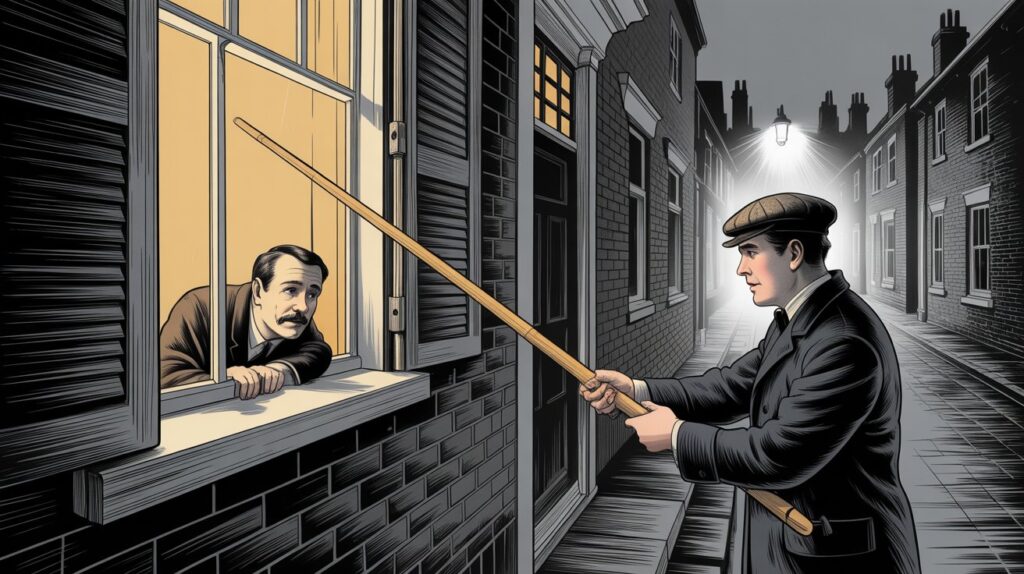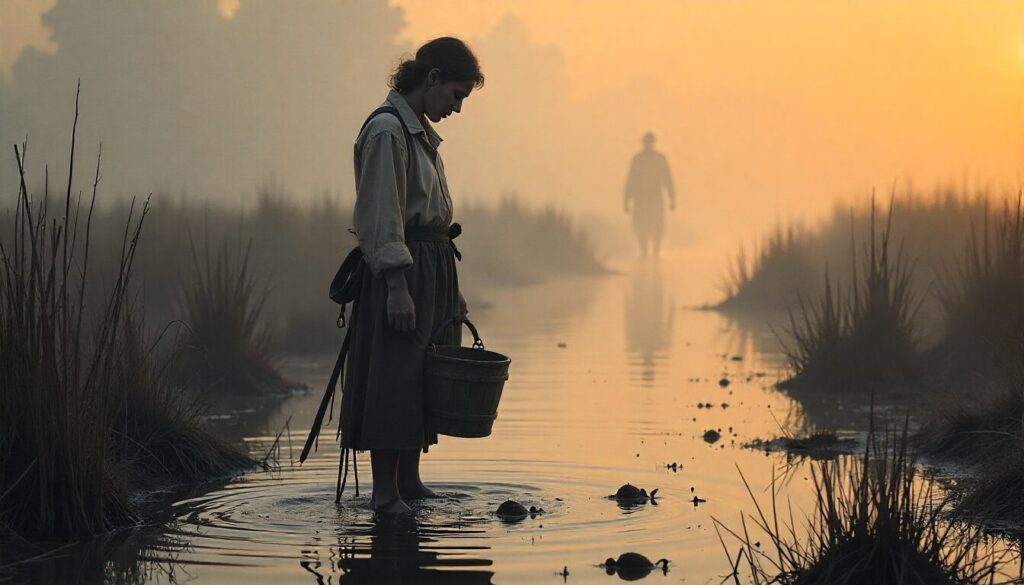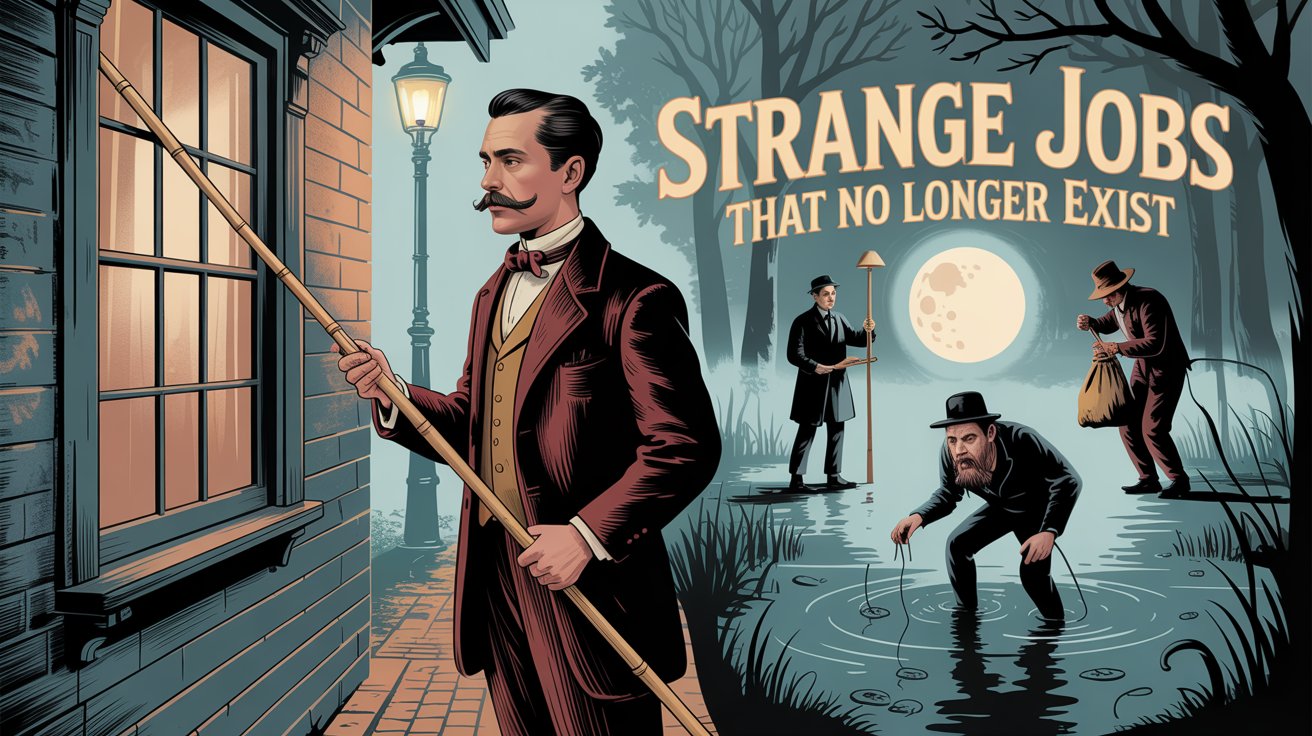If you think your job is weird, wait until you hear about the people who used to knock on windows with long sticks to wake others up… or the ones who collected leeches for a living. History is packed with strange jobs that no longer exist—professions that once made perfect sense in their time but have since disappeared. Some were replaced by technology, others by changes in culture, and a few… well, they were just too strange to last.
Grab a cup of tea, because we’re about to travel back to an era when “going to work” might mean carrying a lantern through the streets, sniffing for rats, or diving into rivers in search of old clothes.
10 strange jobs that no longer exist
The Knocker-Upper

Long before alarm clocks (and definitely before iPhone alarms), people hired a knocker-upper to make sure they got out of bed on time.
Armed with a long bamboo pole or a pea shooter, the knocker-upper would tap on bedroom windows or shoot dried peas at the glass until the client woke up. It was a common job in Britain and Ireland during the Industrial Revolution, especially for factory workers who had to start their shifts at dawn.
And here’s the best part—who woke up the knocker-upper? Sometimes, they hired another knocker-upper… or just relied on an early internal clock.
The Rat Catcher
Cities in the 18th and 19th centuries had a big problem—rats. They spread disease, damaged grain stores, and made life miserable for city dwellers. Enter the rat catcher, an essential (and rather brave) profession.
Rat catchers used dogs, traps, and sometimes their bare hands to capture the rodents. Many of them worked for local councils or big businesses like grain mills. Others took a more… entrepreneurial approach, catching rats and selling them for rat-baiting contests (a cruel sport of the time).
It was risky—rat bites were common, and disease was always a danger—but the pay was surprisingly good for those who could handle the job.
The Leech Collector

Yes, it’s exactly what it sounds like. In the days when bloodletting was considered a cure for almost anything—fevers, headaches, even bad moods—leeches were in high demand.
Leech collectors waded into marshes, ponds, and swamps, letting the bloodsuckers attach to their legs before carefully removing and selling them to doctors and apothecaries. The job was messy, dangerous, and could lead to infections… but without them, 19th-century medicine would have been in trouble.
And here’s a fun twist—today, leeches are still used in modern medicine for certain procedures, but thankfully, you don’t have to stand in a bog to collect them anymore.
The Resurrectionist (Body Snatcher)
This one might send shivers down your spine. In the 18th and 19th centuries, medical schools needed human cadavers for anatomy lessons—but legal supply was limited. That’s where resurrectionists came in.
Under the cover of night, these individuals dug up freshly buried bodies and sold them to surgeons and medical students. The pay was lucrative, but the risks were enormous—getting caught could mean prison, public shame, or even violent mobs.
The practice eventually ended with changes in the law, which allowed medical schools to obtain unclaimed bodies legally. But for a while, graveyards were dangerous places… even after death.
The Gong Farmer
Let’s be honest—plumbing wasn’t always around. In medieval England, large public toilets and castle latrines emptied into deep pits called cesspits. Someone had to clean them out, and that person was the gong farmer.
Armed with buckets and shovels, gong farmers worked at night (because the smell was unbearable in the day) and hauled human waste away for disposal. The job was so unpleasant that they were paid unusually high wages compared to other laborers.
Still, most people avoided them in public—being a gong farmer came with both money and extreme social stigma.
The Lamp Lighter
Before electric streetlights, cities were lit by gas lamps. Every evening, lamp lighters would walk the streets with a long pole to ignite each lamp, then return at dawn to snuff them out.
The job required good timekeeping, a steady hand, and a lot of walking. Lamp lighters also acted as unofficial watchmen, since they roamed the streets at night.
By the early 20th century, electric lighting made the profession obsolete. Today, you might still find lamp lighters in historic districts, but mostly as a tourist attraction.
The Switchboard Operator
If you made a phone call in the early 1900s, you didn’t dial a number—you spoke to a switchboard operator. Usually women, these workers connected calls manually by plugging wires into the right circuits.
Operators were the heart of the telephone network, but the job was intense. They had to work fast, remember numbers, and remain polite no matter how rude the caller.
Automation eventually replaced human operators, but in their time, they were vital to communication.
The Ice Cutter
Before refrigerators, the only way to keep things cold was with ice—and lots of it. Ice cutters worked on frozen lakes in winter, sawing huge blocks of ice, hauling them to icehouses, and storing them until summer.
It was brutally cold work, often involving long hours in dangerous conditions. Falling through the ice was a constant threat. Still, without them, people couldn’t store meat, dairy, or fresh produce for long periods.
The Lector
Factories in the early 20th century could be noisy and monotonous. In cigar factories in Cuba and the U.S., workers hired a lector—a person who would read books, newspapers, and political writings aloud while employees worked.
Lectors were highly respected, and their readings often sparked lively debates among workers. Unfortunately, some employers saw them as too politically influential and banned them, ending a tradition that kept factory life more engaging.
The Human Alarm Clock (Different from the Knocker-Upper)
While knocker-uppers used poles and pea shooters, some wealthier households hired a human alarm clock—someone who would physically come into the bedroom and shake or call the person awake. This was especially common for business owners, ship captains, and travelers who couldn’t afford to oversleep.
It might sound like a dream job… until you have to wake a grumpy person at 4 AM.
Why These Jobs Disappeared?
Most of these professions vanished for one simple reason—technology. Alarm clocks replaced knocker-uppers, modern plumbing made gong farmers obsolete, and electric lights ended the need for lamp lighters.
Others disappeared because society changed—rat catchers aren’t needed as much thanks to pest control companies, and resurrectionists vanished because of legal reforms. Some jobs, like leech collecting, still exist but in a far more regulated and less gruesome form.
What We Can Learn from These Old Jobs?
While many of these roles sound strange—or even disgusting—today, they were essential in their time. They remind us how much work life has evolved and how people have always adapted to the needs of their era.
Next time you complain about your inbox or morning commute, just remember—at least you’re not standing in a freezing bog with leeches clinging to your legs.
Frequently Asked Questions (FAQs)
What are some jobs that don’t exist anymore?
Examples include knocker-uppers (human alarm clocks), lamp lighters, leech collectors, rat catchers, ice cutters, and resurrectionists (body snatchers). These vanished due to technology, law changes, and modern infrastructure.
Do leech collectors still exist today?
In a way—modern medical leeches are bred in controlled environments, so no one has to wade into swamps anymore.
Were rat catchers officially hired by cities?
In many cases, yes. Cities, mills, and farms paid them to keep rodent populations under control.
Are there any jobs today that might seem strange in the future?
Absolutely—professions like social media manager or esports coach might seem bizarre to people 100 years from now.
What’s the rarest job to have?
Historically, roles like royal food tasters, medieval falconers, and cigar factory lectors were extremely rare. Today, highly specialized crafts like hand-painting porcelain or restoring antique organs are rare professions.
Which career did not exist 20 years ago?
Careers like social media managers, app developers, drone operators, and esports coaches didn’t exist—or were extremely niche—two decades ago.
What is the world’s toughest job?
“Toughest” can mean physically demanding, mentally exhausting, or emotionally draining. Jobs like deep-sea fishing, military service in active war zones, and high-altitude mining are often considered among the hardest.
What is a unique job?
A unique job is one that requires very specialized skills or exists in a niche industry—such as professional ethical hacker, voice actor for video games, or wildlife relocation expert.
Which jobs will not be replaced?
Roles that rely heavily on human creativity, empathy, and complex judgment—such as therapists, artists, and high-level strategists—are less likely to be replaced by automation or AI.
What jobs have disappeared because of AI?
AI has largely replaced some data entry roles, basic translation jobs, certain telemarketing positions, and parts of customer service support through automated chatbots.
What is the longest career ever?
One of the longest careers recorded is Walter Orthmann of Brazil, who worked for the same company for over 85 years, starting in 1938.
What is the best career in history?
“Best” depends on perspective, but historically, skilled trades like blacksmithing and shipbuilding were highly respected and well-paid. Today, careers in medicine, technology, and engineering are considered top choices.
Final Thoughts
Strange as they may sound now, these old jobs were once normal parts of everyday life. They tell the story of human creativity, survival, and the endless ways people find to make a living. Who knows? The jobs we think are ordinary today might one day seem just as bizarre to future generations.






